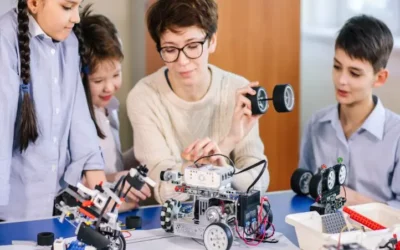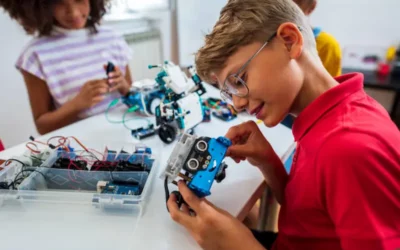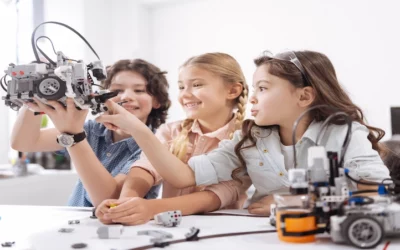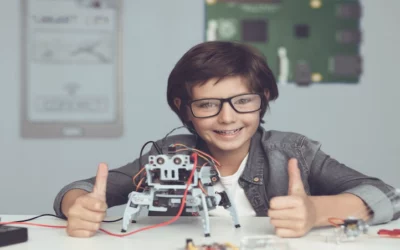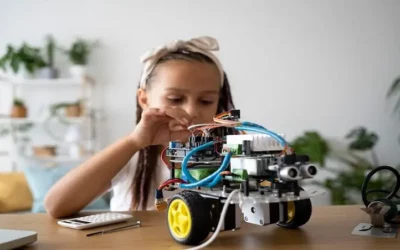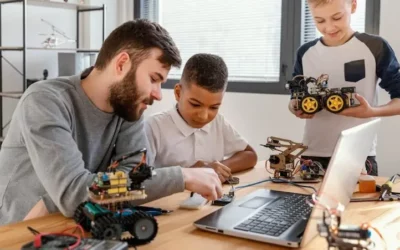Robotics in education provides a hands-on approach that immerses kids in the fascinating world of science, technology, engineering, and mathematics (STEM). By engaging with robots, children develop essential problem-solving and critical thinking skills while exploring complex concepts in a fun and accessible manner. This interactive learning experience not only instils a deeper understanding of STEM subjects but also nurtures a love for exploration and discovery.
So, robotics for kids goes beyond traditional teaching methods, encouraging active learning and fostering a lifelong love for exploration and innovation. As we embark on this journey of discovery, let us explore the exciting possibilities that robotics in education offers, as we equip the next generation with the skills and knowledge, they need to shape a brighter and more technologically advanced future.

Table of contents
How Robotics Inspires Tomorrow’s Innovators
One of the keyways robotics inspires tomorrow’s innovators is by making learning exciting and accessible. Robotics in education is a fascinating field that has the power to inspire tomorrow’s innovators, especially kids. It presents an exciting and interactive way for children to learn about technology, engineering, and problem-solving. Here are some keyways robotics inspires kids to become innovators:
1.Hands-on Learning: Robotics in education promotes hands-on learning, enabling children to construct and program robots themselves. This interactive approach helps them grasp intricate concepts in science, technology, engineering, and mathematics (STEM) in an enjoyable and immersive manner.
Also, Robotics courses for kids is emphasized to provide an immersive and interactive experience, enabling children to gain practical skills and knowledge while having fun with building and programming robots.
2.Real-World Applications: Children can witness the practical applications of robotics in various sectors, like industries, space exploration, medical devices, and everyday life. This aspect motivates them to tackle real-world challenges and comprehend the impact of their knowledge on society.
3.Future Job Opportunities: As the world becomes more automated, robotics-related skills are in high demand. Introducing kids to robotics prepares them for future job opportunities in emerging fields and industries.
Check out robotics classes for kids.
Choosing the Right Robotics Kit for Your Child
Choosing the right robotics kit for kids is an exciting and important decision that can spark their interest in technology and help develop valuable skills.
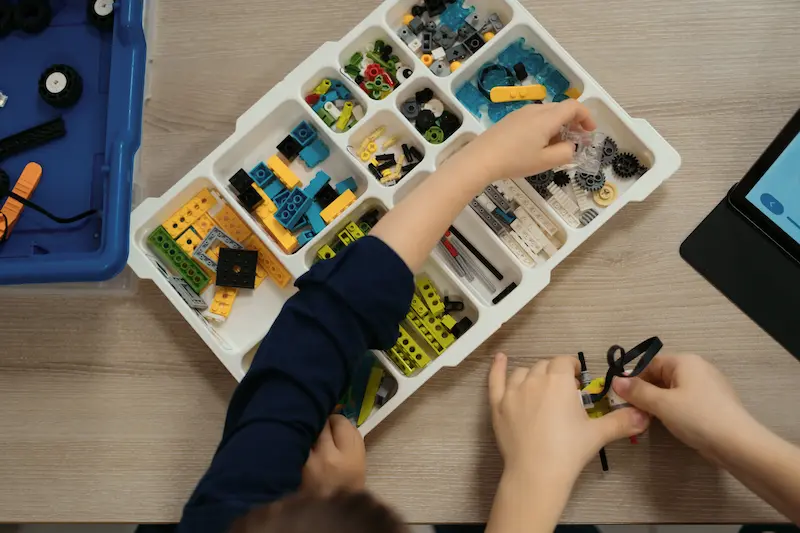
Understanding Different Types of Kits
When it comes to robotic kits for kids, there is a wide variety of options available, each catering to different age groups, skill levels, and interests. Here are some common types of robotic kits designed for children:
1.LEGO Robotics Kits: LEGO-based robotic kits blend LEGO building with robotics, featuring bricks, motors, sensors, and a programmable controller for kids to construct and code various robots.
2.Programmable Robot Kits: These advanced kits include pre-assembled components like programmable controllers, sensors, and motors, allowing kids to program robots for specific tasks and movements.
3.Remote-Controlled Kits: Remote-controlled robotic kits are simpler and focus on the fun of controlling robots with remote devices. They are suitable for younger kids who may not be ready for programming yet.
4.Solar-Powered Kits: Solar-powered robotic kits teach kids about renewable energy. They come with solar panels that power the robot’s movements and teach kids about environmental sustainability.
5.STEM Learning Kits: Some robotic kits are designed to focus on specific STEM concepts like mechanics, electricity, or physics. These kits provide a hands-on approach to learning STEM principles through building and programming robots.
Robotics kits for kids are educational tools that typically include various components and materials, such as motors, sensors, wheels, and programming platforms, allowing children to build and program their own robots. Robotics projects for kids are exciting and educational activities that enable young learners to engage in hands-on experiences, building and programming their own robots.
Factors to Consider When Selecting a Kit
When selecting a robotic kit for kids, there are several important factors to consider to ensure an enjoyable and educational experience. Here are some key considerations:
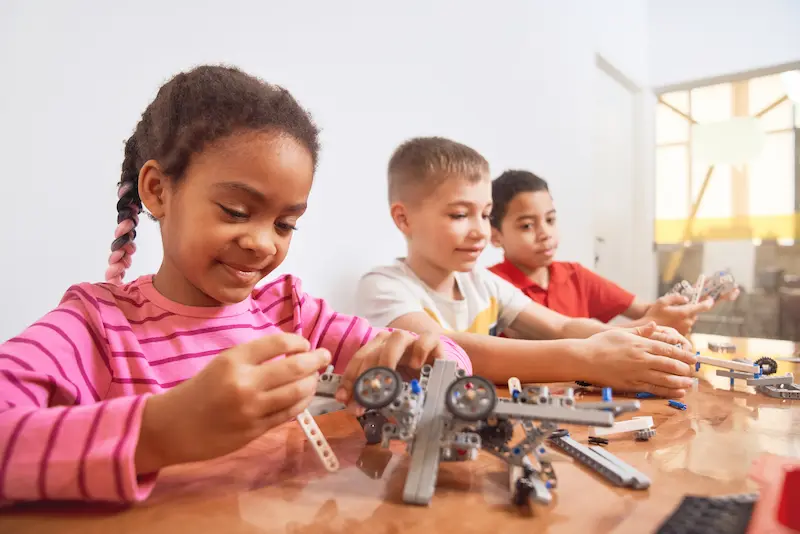
1.Age appropriateness: Select a robotic kit that matches your child’s age and skill level, with options ranging from simpler assembly
2.Safety: Prioritize safety by choosing robotic kits made of safe materials, free from small choking hazards, and suitable for children.
3.Ease of use: Opt for a beginner-friendly robotic kit with easy assembly, a user-friendly interface, and clear instructions to enhance the learning process and enjoyment.
4.Programming options: When programming is involved, consider the language or platform used; Scratch is suitable for younger children.Robotics programming for kids is a fantastic way to introduce young learners to the world of coding and robotics. Through interactive and age-appropriate programming platforms, children can learn to write code and control robots, making them move, interact, and perform various tasks.
5.Compatibility and support: Verify kit compatibility with your child’s devices and operating systems, and check for reliable customer support and active online communities to provide help and inspiration.
6.Budget: Consider your budget and find a kit that offers a good balance between affordability and features.
7.Reviews and recommendations: Gain valuable insights and make an informed decision by reading reviews and seeking recommendations from parents or educators who have experience with the robotic kit you are considering.
8.Interests and preferences: Take into account your child’s interests and preferences. Choosing a robotic kit that aligns with their passions can enhance their motivation to learn and experiment.
Safety First: Robotics and Your Child
Robotics in education can be an incredible learning experience for children, offering valuable skills for their future. By following safety guidelines and providing proper supervision, parents can ensure that their child’s journey into robotics remains both educational and safe.
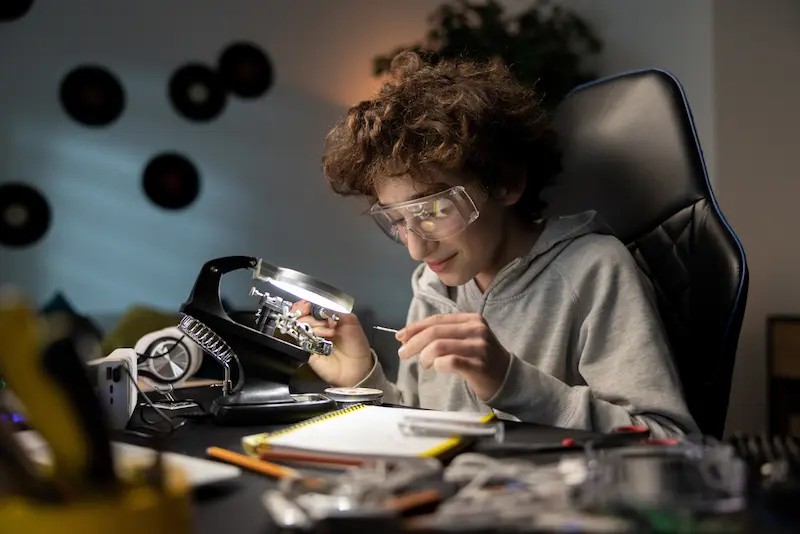
1.Adult Supervision: Always ensure that an adult supervises robotics activities, particularly when using tools or handling hazardous materials, to prevent accidents and provide immediate assistance if needed.
2.Age-Appropriate Kits: Choose robotics kits and projects that are suitable for your child’s age and skill level. This will prevent frustration and minimize the risk of injuries due to complex components.
3.Understanding Manuals and Instructions: Read and understand the manuals and instructions provided with robotics kits.
4.Safe Workspace: Set up a safe workspace with adequate lighting and sufficient space to prevent tripping hazards. Keep the area organized and free of clutter to avoid accidents.
5.Battery Safety: Teach your child about the safe handling and charging of robot batteries. Only use manufacturer-recommended chargers and store batteries in a cool, dry place.
6.Awareness of Surroundings: Encourage your child to be aware of their surroundings during robotics activities. This includes being cautious of others nearby and keeping liquids away from electronic components.
The Benefits of Robotics in Education

Robotics education for kids offers a wide array of benefits that contribute to their cognitive, social, and technological development. Here are some of the key advantages:
1.Enhanced Problem-Solving Skills: Robotics education encourages kids to tackle real-world challenges and find innovative solutions.
2.Fostering Creativity and Imagination: Building and customizing robots allows kids to unleash their creativity and imagination. They can experiment with different designs, functionalities, and programming concepts, encouraging them to think outside the box and explore unique possibilities.
3.Introduction to Coding and Programming: Robotics education provides a practical introduction to coding and programming concepts. Kids learn to write code to control their robots, which enhances their computational thinking skills.
Joining the Robotics Community
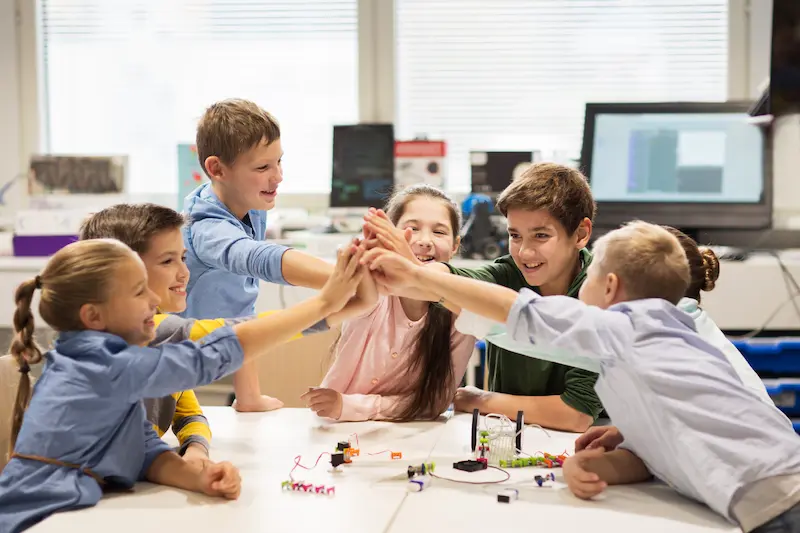
Research Local Robotics Clubs and Teams: Look for robotics clubs or teams in your local community or schools. These groups often participate in competitions, workshops, and hands-on projects.
1.Participate in Workshops and Events: Many robotics communities organize workshops, events, and seminars. These events provide opportunities for kids to learn from experienced mentors, gain practical knowledge, and meet like-minded peers who share their passion for robotics.
2.Online Robotics Communities: There are various online platforms where kids can engage with the robotics community. Forums, social media groups, and educational websites often have dedicated sections for robotics enthusiasts to share ideas, ask questions, and collaborate on projects. Also, Online robotics courses for kids offer an excellent opportunity to delve deeper into the exciting world of robotics from the comfort of their homes.
3.Attend Robotics Camps or Classes: Many organizations offer robotics-focused summer camps or classes.
4.Be Supportive and Encouraging: As a parent or guardian, support and encourage your child’s interest in robotics. Celebrate their achievements, provide resources, and help them stay motivated throughout their robotics journey.
Check out robotics for kids 5 year old.
Conclusion
In conclusion, integrating robotics in education brings forth a myriad of benefits that positively impact students and the learning process.
By incorporating robotics into the curriculum, educators can create a dynamic and interactive learning environment that nurtures creativity, problem-solving skills, and collaboration.
One of the key advantages of using robotics in education is its ability to make complex concepts more tangible and relatable. Students can witness firsthand how theoretical knowledge is applied in practical situations, allowing for a deeper understanding of science, technology, engineering, and mathematics (STEM) subjects.
To get your hands on more such educational and free resources on coding, robotics, game development, etc., do check out the Brightchamps Blog Page now!
BrightChamps also offers an exceptional program focused on financial literacy for kids. Through their engaging and interactive courses, children can gain valuable knowledge about money management, saving, budgeting, and the basics of finance.
Frequently Asked Questions (FAQs)
A. Generally, children aged 7 to 10 years old can start with basic robotics concepts using simple kits and programming languages that involve visual blocks.
A. Robotics can be integrated into non-STEM subjects to enhance creativity, critical thinking, and interdisciplinary learning.
A. Yes, Several organizations offer free or low-cost robotics kits to schools with budget constraints.
Example: LEGO Education Wedo 2.0, Arduino Starter Kits
A. Yes, robotics education can benefit students not interested in STEM careers by fostering creativity, problem-solving skills, and teamwork, applicable in various fields and enhancing their technological literacy for everyday life.
A. Robotics programs can be made more inclusive for students with disabilities by using adaptable kits, providing diverse roles, and fostering a supportive environment.


 We are an army of educators and passionate learners from BrightChamps family, committed to providing free learning resources to kids, parents & students.
We are an army of educators and passionate learners from BrightChamps family, committed to providing free learning resources to kids, parents & students.








